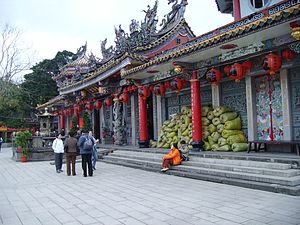Tan Goan-kong
| Tan Goan-kong | |||||||||||||||||||||||
|---|---|---|---|---|---|---|---|---|---|---|---|---|---|---|---|---|---|---|---|---|---|---|---|
| 陳元光 | |||||||||||||||||||||||

The Zhishanyan Huijigong Temple in Taipei, Taiwan. This temple is dedicated to the "Sacred Prince, Developer of Zhangzhou," Chen Yuanguang
|
|||||||||||||||||||||||
| Personal details | |||||||||||||||||||||||
| Born | 657 Gushi County, Henan |
||||||||||||||||||||||
| Died | 0711 (aged 54) | ||||||||||||||||||||||
|
|||||||||||||||||||||||
| Tan Goan-kong | |||||||||||||||
| Traditional Chinese | 陳元光 | ||||||||||||||
|---|---|---|---|---|---|---|---|---|---|---|---|---|---|---|---|
| Simplified Chinese | 陈元光 | ||||||||||||||
|
|||||||||||||||
| Transcriptions | |
|---|---|
| Standard Mandarin | |
| Hanyu Pinyin | Chén Yuánguāng |
| Wade–Giles | |
| Jyutping | |
| Southern Min | |
| Hokkien POJ | Tân Goân-kong |
Tan Goan-kong (Chinese: 陳元光; pinyin: Chén Yuánguāng; Pe̍h-ōe-jī: Tân Goân-kong; 657–711), courtesy name Tingju (Chinese: 廷炬; pinyin: Tíngjù), pseudonym Longhu (龍湖; Lónghú), was a Tang Dynasty general and official. He was from Gushi County, Henan. The people of Zhangzhou, Fujian, along with the descendants of immigrants from Zhangzhou to Taiwan, Singapore and Malaysia, all refer to him as the "Sacred Prince, Developer of Zhangzhou" (開漳聖王; Kāizhāngshèngwáng; Khai-Chiang Sèng-ông).
At the age of 13, he accompanied his father Chen Zheng (simplified Chinese: 陈政; traditional Chinese: 陳政; pinyin: Chén Zhèng), commander of the Southern China military expeditionary force, on a march to Fujian, for the purpose of setting up a regional administration. In April of the second year of the Emperor Gaozong of Tang (677), Chen Zheng died in the line of duty, Chen Yuanguang took over his father's duties, and led the troops in place of his father. At this time, the emperor granted him the title "General of the left guard, and jade bell defender of the county seat". He then proceeded to quell uprisings by local ruffians such as Chen Qian (simplified Chinese: 陈谦; traditional Chinese: 陳謙; pinyin: Chén Qiān) of Guangdong, as well as Miao Zicheng (Chinese: 苗自成) and Lei Wanxing (simplified Chinese: 雷万兴; traditional Chinese: 雷萬興; pinyin: Léi Wànxīng), both of whom were leaders of a bandit gang named the "savage colleagues". As a result, the southern Fujian region was pacified, and Chen Yuanguang was promoted to the rank of senior magistrate of upright character, and granted the title of commander of the Southern China military expeditionary force.
...
Wikipedia
